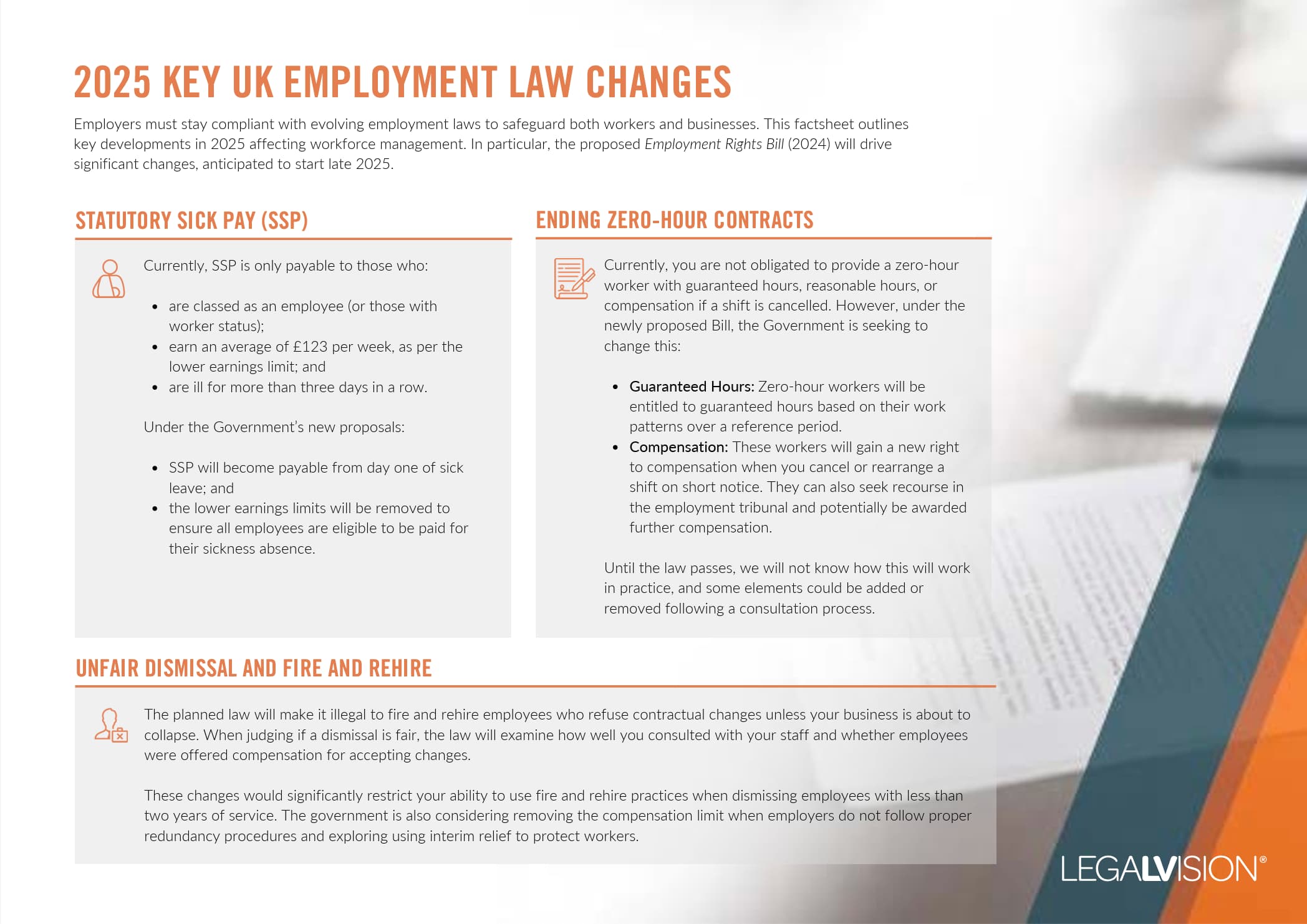In Short
- A process where employers and trade unions negotiate employment terms, including pay, hours, and conditions.
- Governed by the Trade Union and Labour Relations (Consolidation) Act 1992, agreements may address wage structures, holiday entitlements, and grievance procedures.
- Can occur voluntarily or through statutory processes; recognised unions gain rights to negotiate and represent workers.
Tips for Businesses
- Collect data and establish clear negotiation objectives.
- Keep detailed records of agreements and any changes.
- Clear communication with unions and employees can help manage expectations and resolve misunderstandings efficiently.
As an employer, you may have encountered the term ‘collective bargaining’ and the associated ‘collective bargaining agreement’. This article will cover what collective bargaining and collective agreements are, how collective bargaining works in practice, the process of trade union recognition, and the benefits of collective bargaining for your business.
What is Collective Bargaining?
Collective bargaining is the process of negotiating the terms and conditions of employment with employee representatives, such as trade unions or employee associations. Some common matters covered by collective bargaining typically include pay, pension contributions, holiday entitlements, and other working conditions.
The outcome of such negotiations results in a ‘collective bargaining agreement’ which sets out the terms and conditions that were agreed upon following the conclusion of the talks.
Collective Bargaining Agreement
Collective bargaining agreements are not typically binding in the UK unless expressly incorporated into individual employment contracts to ensure your employees benefit from any agreed-upon terms or amendments.
Crucially, collective bargaining agreements are important frameworks that establish the employment relationship between you and your employees. These agreements commonly include (but are not limited to):
- wage scales and salary structures;
- working hours and shift patterns;
- overtime rates and procedures;
- holiday entitlements;
- sick pay arrangements;
- grievance and disciplinary procedures;
- health and safety protocols; and
- redundancy terms.
Call 0808 196 8584 for urgent assistance.
Otherwise, complete this form, and we will contact you within one business day.
What is the Procedure for Collective Bargaining?
In the UK, collective bargaining is governed primarily by the Trade Union and Labour Relations (Consolidation) Act 1992. This legislation provides the legal framework for:
- recognition of trade unions;
- protection of workers involved in union activities;
- requirements for consultation and negotiation; and
- dispute resolution procedures.
While there is no legal requirement for you to engage in collective bargaining, once a union is formally recognised, you must negotiate with them on specific statutory matters.
The process begins with both parties (employer and employee representatives) gathering relevant data and information, establishing objectives and formulating initial positions. This is followed by negotiation, where proposals and counter-proposals are exchanged, terms and conditions are discussed, and positions are adjusted through compromise.
Once an agreement is reached, final terms are drafted, reviewed by both parties and formally signed. Implementation then involves communicating terms to the workforce, incorporating changes into employment contracts, and establishing new procedures.
Potential Challenges
Several challenges may arise during collective bargaining. These can include economic constraints such as market conditions affecting:
- wage negotiations;
- company financial performance; and
- competition considerations.
Communication issues might involve:
- misunderstandings between parties;
- complex technical details; and
- managing expectations.
Legal compliance requires ensuring agreements meet statutory requirements, understanding the regulatory framework and maintaining proper documentation.
Thorough preparation involves gathering relevant data, understanding industry standards and considering long-term implications. Documentation and detailed records of negotiations, clear written agreements, and records of all changes and amendments are crucial.

This factsheet outlines key developments in 2025 affecting workforce management.
Recognition of Trade Unions
Trade union recognition in the UK refers to formally acknowledging a union’s right to represent workers in workplace negotiations. This process can occur either voluntarily, where you willingly recognise a union, or through statutory recognition, where a union gains recognition through legal procedures outlined in the Trade Union and Labour Relations (Consolidation) Act 1992.
Voluntary recognition occurs when you agree to recognise a trade union without being legally compelled. This typically happens when both parties see mutual benefits in establishing a formal relationship. You and the union will usually sign a recognition agreement detailing the scope of your relationship, including which workers the union represents and what matters they will negotiate over.
A body must meet certain conditions for a ‘statutory recognition’ application to succeed. The union must send a copy of their application and any supporting documents to you, show that at least 10% of workers in the proposed bargaining unit are union members, and evidence the fact that a majority of workers are in favour of recognition (example, a petition), among other things.
What are the Effects of Trade Union Recognition?
Once recognised, trade unions gain specific rights, including the right to be informed and consulted about certain workplace matters, to negotiate over pay, hours and holidays, and to represent members in grievance and disciplinary matters. You must disclose information to the union for collective bargaining purposes. Your business should also consult with them over proposed redundancies or business transfers.
Key Takeaways
Collective bargaining offers a streamlined negotiation process, improved industrial relations, a clear framework for dispute resolution, enhanced workplace stability and better communication channels with your workforce. Employees benefit from a stronger negotiating position, consistent treatment across the workforce, professional representation, protected rights and interests, and formal procedures for addressing concerns.
If you need help understanding collective bargaining in England and Wales, our experienced employment lawyers can assist as part of our LegalVision membership. For a low monthly fee, you will have unlimited access to lawyers to answer your questions and draft and review your documents. Call us today on 0808 196 8584 or visit our membership page.
Frequently Asked Questions
Collective bargaining involves negotiating employment contracts between staff, through their unions, and employers. Topics of negotiation may include pay, hours, leave, and flexible working arrangements.
Some examples of collective bargaining include pay rise negotiations or changes in work shifts and annual leave allowances.
We appreciate your feedback – your submission has been successfully received.












